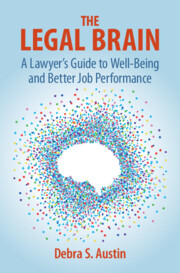Book contents
- The Legal Brain
- The Legal Brain
- Copyright page
- Dedication
- Contents
- Acknowledgments
- Introduction
- 1 The Impaired Lawyer
- 2 The Spectrum from Languishing to Flourishing
- 3 The Lawyering Culture
- 4 The Lawyer’s Brain
- 5 Memory, Knowledge, and Building Expertise
- 6 Motivation, Reward, and Developing Habits
- 7 The Impact of Stress
- 8 The Influence of Self-Medication
- 9 The Importance of Fuel
- 10 Optimizing Brain Health
- 11 Enhancing Mental Strength
- 12 Developing an Action Plan for the Neuro-intelligent Lawyer
- 13 The Neuro-intelligent Legal Organization
- Conclusion
- Select Bibliography
- Index
1 - The Impaired Lawyer
Published online by Cambridge University Press: 08 May 2024
- The Legal Brain
- The Legal Brain
- Copyright page
- Dedication
- Contents
- Acknowledgments
- Introduction
- 1 The Impaired Lawyer
- 2 The Spectrum from Languishing to Flourishing
- 3 The Lawyering Culture
- 4 The Lawyer’s Brain
- 5 Memory, Knowledge, and Building Expertise
- 6 Motivation, Reward, and Developing Habits
- 7 The Impact of Stress
- 8 The Influence of Self-Medication
- 9 The Importance of Fuel
- 10 Optimizing Brain Health
- 11 Enhancing Mental Strength
- 12 Developing an Action Plan for the Neuro-intelligent Lawyer
- 13 The Neuro-intelligent Legal Organization
- Conclusion
- Select Bibliography
- Index
Summary
Compared to other graduate students, law students are less fulfilled, and they handle the culture of intense competition by binge-drinking and using more marijuana, than other graduate students. The culture of law practice is not an improvement, due to the steep billable hour requirements and responsibility for client outcomes. Lawyers suffer from anxiety and depression at higher rates than the general population, and they are at the greatest risk of suicide among professionals behind only those in the medical field. Alcohol misuse is a significant problem, with one study finding that 20 percent of lawyers are problem drinkers and another revealing that 46 percent of male and 60 percent of female attorneys abuse alcohol. Lawyers in the first 10 years of their career have the most problematic drinking habits. The lawyering culture, featuring extreme stress, intense competition, and overwork, can drive lawyers to succumb to mental and physical health problems. International Bar Association research indicates there is a global crisis in lawyer well-being. Young, minority-identifying, and female-identifying lawyers, and lawyers with disabilities, all fall below the WHO Mental Wellbeing Index threshold requiring a mental health assessment, and suggesting a connection between well-being and issues with diversity, equity, and inclusion.
Keywords
- Type
- Chapter
- Information
- The Legal BrainA Lawyer's Guide to Well-Being and Better Job Performance, pp. 9 - 25Publisher: Cambridge University PressPrint publication year: 2024

